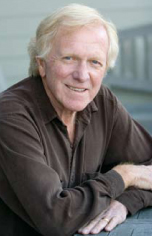The no-growth attitude of many Marin residents toward development and the environment is stuck in the sixties; say two of the county’s most prominent environmentalists. Both maintain that this Nancy Reagan–like “Just say no!” attitude is enlarging—not reducing—the county’s already oversize ecological footprint.
To Supervisor Charles McGlashan, November’s narrow defeat of the Sonoma Marin Area Rail Transit (SMART) proposal by Marin voters is the latest manifestation of this decades-old posture. “It is a tone of negativity that has its origins in the success of having dodged the very dangerous bullet of bad development ideas in the ’60s and ’70s,” says McGlashan. “What that long-ago success has done, however, is lock in a small but powerful portion of the Marin environmental movement into repeatedly saying no to progressive solutions for the problems of today.”
Sierra Club President Gordon Bennett, speaking for himself and not Marin’s 7,000 Sierra Club members, was more succinct but equally emphatic. “Marin has to be more creative than just saying ‘no,’” he says. “That worked in the ’60s and ’70s, but it isn’t working now.”
Bennett, a resident of Inverness, says SMART’s loss involved more than rejection of a commuter rail system. “The concept of ‘smart growth’ was defeated,” he says. He believes Marin must have some growth because “you can’t repeatedly deny property owners their constitutional rights.” But such development, says Bennett, should be concentrated near transportation systems. “I’m talking about areas close to effective bus lines, near ferry terminals, and, yes, where SMART could have transported people without them getting into their cars.”
Both Bennett and McGlashan believe that in many ways, Marin voter’s verdict indicates they love their autos more than their environment. Bennett’s solution for necessary development is easy to explain, but possibly challenging to enact. “Property owners on ridgelines and remote hillsides should be allowed to sell their ‘development rights’ to those wanting to build on sites nearer established transportation routes,” he says. “That way we could have growth—which is necessary for economic vitality and environmental sustainability—without impacting Marin’s already clogged and outdated surface streets.”
McGlashan hopes Marin community leaders will modernize their approach to development. “The old thinking believes that it’s less intensive to have a couple of big homes with a few cars than 10 units of affordable housing,” he says. “But that’s wrong.” He cites a recent study of large homes built above Mill Valley that found residents there each making as many as 11 car trips a day. “Going to work; taking kids to school; buying groceries; getting a book in Corte Madera; seeing a doctor in Larkspur—the trips inevitably mount up.
“Many in Marin are stuck in ’60s and ’70s thinking,” he says, “and hopefully they’ll come to understand and trust infill, high density, and mixed use development, along with senior and affordable housing projects, as a way of actually reducing our ecological footprint.”
Marin’s ecological footprint—the number of acres of the earth’s available land and water needed to sustain one individual for one year—is already oversize (recent estimates put it over 27 global acres, compared to Italy’s 12 acres). “Of the Bay Area’s 11 counties, Marin is second-smallest in population,” McGlashan says, “but we have the area’s third-largest footprint—behind only Solano and Contra Costa counties.” He’s convinced Marin must find a compromise between rampant development and no growth at all. “Finding a middle ground is now essential,” he says, “or Marin will continue to be irresponsible in the face of global climate change.” An example of such a compromise would be workforce housing which eliminates the need for long commutes.
Bennett agrees. “It may sound contradictory, but we increase our ecological footprint by insisting on larger homes and lower density,” he says. “Sustaining Marin’s quality of life now depends on approving high-density housing, having it close to efficient transportation, and reducing our dependency on the car.”
Hopefully that message will soon get across, and Marin will stop merely saying no to common sense solutions for today’s development and environmental problems. That’s my point of view. What’s yours?
Email [email protected]


